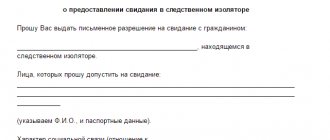Being in prison is a difficult period in the life of a person who has broken the law. At this time, he needs both moral and material support from relatives. Relatives who are far from the prisoner can send their parcel to the pre-trial detention center via Russian Post. Such delivery will take a lot of time and require certain financial expenses, but in the end the prisoner will receive the parcel with a 100% probability.
Sending a package to a pre-trial detention center: what the correct package should be, important features
Being in prison is a difficult period in the life of a person who has broken the law. At this time, he needs both moral and material support from relatives. Relatives who are far from the prisoner can send their parcel to the pre-trial detention center via Russian Post. Such delivery will take a lot of time and require certain financial expenses, but in the end the prisoner will receive the parcel with a 100% probability.
The procedure for receiving and receiving parcels, transfers, parcels by convicts
Relatives of the convicted person are allowed to send parcels, packages, parcels to the correctional facility.
Parcels, packages, parcels can be sent to convicted women and persons held in the VK without any limitation on the number. The number of parcels, transfers and parcels for convicted men depends on the type of correctional facility and the conditions in which they are serving their sentence. The penitentiary establishment establishes: ordinary, simplified, and strict conditions for serving the sentence.
If your relative is in a general regime prison, then under normal conditions he can receive 6 parcels or packages and 6 parcels during the year. In light conditions - 12 parcels or packages, 12 parcels. Under strict conditions - 3 parcels or packages and 3 parcels.
If your relative is serving a sentence in a high-security prison, then under normal conditions he can receive 4 parcels or parcels and 4 parcels during the year. In light conditions - 6 parcels or packages and 6 parcels. In strict conditions - 2 parcels or transfers and 2 parcels.
If your relative is serving a sentence in a special regime penal colony, then under normal conditions he can receive 3 parcels or packages and 3 parcels within a year. In light conditions - 4 parcels or packages and 4 parcels. In strict conditions - 1 parcel or transfer and 1 parcel.
If your relative is in a general regime prison, then he can receive 2 parcels or parcels and 2 parcels during the year.
In a maximum security prison, a convict can only count on 1 parcel and 1 parcel per year.
The convicted person can receive the first parcel, delivery and parcel immediately upon arrival at the correctional facility.
A certain amount of time must pass between the previous and subsequent parcels, transmission and parcel. This time is equal to the number obtained by dividing 12 months by the total number of parcels, transfers, parcels due to the convicted person per year.
When collecting a parcel, parcel or parcel, know that there are food products, things and objects that convicts are prohibited from having with them, receiving in parcels, parcels, or purchasing. This:
• money, valuables, securities, currency of foreign countries;
• wrist and pocket watches (in prisons);
• food products that require heat treatment (except for tea and coffee, milk powder, instant food concentrates that do not require boiling or cooking);
• home canning products, yeast;
• all types of alcoholic drinks, beer;
• perfume, cologne and other alcohol-based products;
• electronic computers, typewriters, duplicating machines and other office equipment;
• knives, straight razors, safety razor blades, piercing and cutting objects, structurally similar to bladed weapons;
• axes, hammers and other tools;
• cameras, photographic materials, chemicals, film cameras, video and audio equipment (except for television receivers, radio receivers), communications equipment and components for them that ensure operation;
• any documents (except for documents of the established form, identifying the convicted person, copies of sentences and court rulings, responses based on the results of consideration of proposals, applications, petitions and complaints, receipts for money, things, valuables handed over for storage);
• compasses, literature on topography, martial arts, service dog breeding, weapons design;
• military and other uniforms, accessories;
• clothing, hats and shoes (except for slippers, tracksuits and sports shoes) of unidentified samples;
• colored pencils, felt-tip pens, markers, ink, ink, ballpoint and gel pens (except for blue and black), paints, copy paper;
• pornographic materials, objects;
• electrical household appliances (except for electric shavers, factory-made household electric boilers).
Instead of the required parcels, transfers, parcels, relatives have the opportunity to purchase food and basic necessities through the store, which is located in every correctional facility, and hand them over to the convict.
Relatives of the convicted person have the right to send money transfers, which are credited to the personal account of the convicted person.
(Articles 90, 91, 121, 123, 125, 131 of the Penal Code of the Russian Federation; sections XI, XII, XVI of the Rules of the Penitentiary Authority; Decree of the Government of the Russian Federation dated April 15, 2005 No. 221 “On approval of the Rules for the provision of postal services”).
Source
On the possibility of sending parcels to convicts by Russian Post
The regulations for sending parcels to pre-trial detention centers are established by the Internal Regulations of Pre-trial Detention Facilities. According to this document, each prisoner is entitled to an unlimited number of parcels, but the total weight of the parcels is limited to 30 kilograms per month.
Certain categories of citizens enjoy a benefit that eliminates the monthly limit on parcels:
- pregnant women;
- minors;
- mothers in pre-trial detention centers with children under three years of age;
- persons suffering from chronic diseases (if there is a medical certificate).
The weight of one parcel accepted by Russian Post should not exceed 20 kg, so each prisoner can receive two parcels per month. It is better to send them with a time interval of 7-10 days. This increases the likelihood of a safe arrival at your destination.
What things are left for a convict upon entering a colony?
It is worth noting that upon admission to a correctional institution, almost all personal belongings of a convicted person are confiscated.
Leave from clothes:
Hygiene products will be left:
Books, as a rule, are also confiscated, since the convicted person is prohibited from possessing literature, especially in foreign languages, or if the books contain various geographical maps or pictures of erotic content.
All seized items are stored in a warehouse outside the zone. Warehouses, as a rule, are in a deplorable condition, because of this, things very quickly become unusable. Therefore, at the first opportunity you should try to pick up all the stored items. This can be done by contacting the local administration.
Once again, it is worth noting that it is better to pick up things immediately, since after at least a couple of months they can turn into rotting rags and shoes, and the financial valuation of these things does not exceed 5–10 rubles, regardless of their real value.
And it is important to know that things are given only to relatives, but common-law wives and friends will most likely be refused.
What is often transferred to pre-trial detention centers?
Before sending a parcel to the prison by mail, you should familiarize yourself with the list of items allowed for acceptance. In addition to hygiene items, several changes of linen and disposable machines, the prisoner must be given cigarettes and tea. Even if a man does not smoke, a few packs of tobacco products will not hurt him - the prison has its own rules of communication between prisoners.
Since postal items have a considerable transit time, everything that can be placed in a parcel of products must have a long shelf life. Most often this happens:
- instant coffee, tea;
- powdered milk;
- instant semi-finished products (mashed potatoes, soups, noodles);
- crackers and biscuits;
- candies;
- onion garlic;
- nuts, dried fruits.
It is advisable to pack light weight and small volume products in a mailbox - this way you will be able to comply with the limit and transfer the maximum number of useful items.
Delivery of medicines and dietary supplements to the colony
In conclusion, we will consider the transfer of medications, dietary supplements and vitamins. This is a very important issue, since the quality of medicines, as well as the assistance itself in places of detention, leaves much to be desired. There are often cases when in medical posts there is nothing except activated carbon, citramon and iodine with bandages.
But it is not so easy to transfer medications; this requires a prescription from the attending physicians and extracts from the patient’s records if the medications contain prohibited substances. For example, if you need to transfer codeine-containing drugs or syringes, you need a special certificate from the doctor of the institution, which is prepared in advance and signed by the attending and chief physician, the head of the operational department and the head of the colony. Next, the certificate is sent to the collection point.
In addition, you must ask the pharmacy for any medicines, dietary supplements or vitamins for a copy of the medicine certificate, which will indicate the composition. It doesn’t matter what it is: activated charcoal, adhesive plaster, paracetamol, Zvezdochka ointment or Doctor MOM.
Alcohol-based medications will not be allowed under any circumstances, so even iodine must be in pencil.
The transfer of medications is outside the prescribed weight; everything transferred will first have to be examined by a worker at the first aid station. If everything is fine, then he will skip the transfer, or rather, take it with him and give the medicine to the convicted person at his own discretion. Therefore, the days for transferring medications are from Monday to Friday, the first half of the day. Provided that transmissions are being received on that day.
Here are the most important transmission rules for convicts serving sentences in correctional colonies, which should be followed at first. Further, as you serve your sentence, it will become clear which things or products need special attention, and what can wait for the next visit or transfer.
Source
Sending a Parcel to Prison: A Step-by-Step Guide
After the list of things permitted for transfer to the detention center has been studied, you can begin collecting the parcel. It is advisable to follow the following procedure:
- all products and industrial goods must be placed in separate transparent bags;
- cigarettes should be removed from the packs, and all products should be freed from packaging;
- the box for the parcel is purchased at the post office - in order to choose the appropriate container size, you need to visually assess the volume of items being sent;
- Things should be packed into the box as tightly as possible, placing the heaviest items in the center. Layered content layout allows you to place many more items;
- fill out an inventory of the contents in three copies - two of them are certified by the operator’s signature and postmark, the third remains in the hands of the sender. When filling out the inventory, the parcel must be presented to the postal worker in an open form;
- correctly fill out the notification form - indicating full name, postal addresses with the obligatory indication of the postal code. The name and patronymic of both the recipient and the sender are written in full, without abbreviations;
- When registering, you can indicate the value of the parcel in rubles - however, you must remember that this will increase the cost of shipping;
- hand over the parcel to the postal worker for packaging. In this case, it is advisable to ensure that the postal tape securely fastens all the connecting seams of the box;
- After paying the cost of the shipment, pick up a receipt that will indicate an identifier - a number by which you can track the passage of the parcel.
Collecting the parcel
Sending a parcel to a pre-trial detention center via Russian Post includes the following steps:
- Buying groceries and things.
- Packaging the contents of the transmission.
- Delivery of the parcel at the Russian Post collection point. Here the citizen pays for the shipping and receives a receipt with a tracking number.
Each of the above stages has its own nuances that should be taken into account when sending. Let's take a closer look at them.
List of approved products
It is allowed to transfer products to the pre-trial detention center that meet the following requirements:
- Does not require storage at low temperatures. Cells in Russian prisons are not equipped with refrigerators, and therefore the most a prisoner can afford is to put food on the windowsill in winter. For this reason, the list of permitted products for summer and winter may differ.
- Does not require heat treatment or cooking. There are no electric stoves or microwaves in the cells. The maximum that prisoners can have is an electric kettle or a low-power boiler. Therefore, instant noodles can be handed over to the pre-trial detention center. But it’s better not to put raw potatoes, meat or dumplings in the parcel.
- The packaging cannot be used as a weapon. For this reason, food in glass containers should not be transferred to the pre-trial detention center. Canned goods will also be opened and given to the prisoner. Therefore, it is advisable to include empty plastic containers in the parcel into which such products can be transferred.
The following products are allowed to be transferred to the pre-trial detention center:
- Tea. It is better to transfer small or medium sheets. Some isolation wards do not accept tea bags. Therefore, it is better to clarify this question in advance.
- Coffee. Natural finely ground or instant. There is no point in transferring coffee beans, since the use of coffee grinders is prohibited in the cells.
- Condensed milk. Only options in plastic containers are allowed.
- Salt, pepper, bouillon cubes.
- Vegetable oil.
- Instant soups and cereals.
- Honey in a plastic container.
- Sausage (it is better to check the details of transferring sausages with the administration of the specific pre-trial detention center).
- Rusks, cookies.
- Dried fruits.
- Salted lard. Some detention centers also allow smoked meats. Sometimes they are included in the list of permitted products only in the cold season.
- Well dried garlic.
- Onion.
Cigarettes can also be transferred to the pre-trial detention center. However, detention center staff may break them during inspection. This is done to make sure that what is inside is tobacco and not drugs. Therefore, it is better to order cigarettes online through a departmental online store.
Have a question for a lawyer? Ask now, call and get a free consultation from leading lawyers in your city. We will answer your questions quickly and try to help with your specific case.
Telephone in Moscow and the Moscow region: +7
Phone in St. Petersburg and Leningrad region: +7
Free hotline throughout Russia: 8 (800) 301-39-20
It is possible to transfer funds to the prisoner’s personal account. In this case, he will be able to purchase everything he needs at a kiosk located on the territory of the detention center.
List of permitted things
According to general rules, a prisoner in a pre-trial detention center can receive basic necessities from relatives. Despite the fact that according to the law, the accused must be provided with basic things, and often there are not enough or their quality leaves much to be desired.
The list of permitted items includes the following:
- 2-3 T-shirts without pockets, patterns or emblems.
- No more than four sets of underwear. It is advisable to choose discreet colors - gray, black, blue. Green or khaki clothing is prohibited, as the security uniform is made in this color scheme.
- Rubber or plastic slippers.
- Shorts (can be transferred in summer).
- Sports suit. In Russian pre-trial detention centers there is an unspoken ban on red suits.
- Pants with elastic (belts and laces are prohibited in cells).
- The jacket is of the simplest cut. All ties and ties should be removed.
- Shoes without metal arch supports, shoes or laces. It is allowed to transfer sneakers. It is better if the shoes are black.
- Dishes made of plastic or aluminum. Forks and knives are prohibited in the cells. Therefore, only teaspoons and tablespoons can be transferred.
- No more than three towels.
- White duvet covers and sheets.
- Sweatshirts and sweaters made of thick fabric. It is forbidden to transfer knitted items, as prisoners may unravel them.
- Personal hygiene items. We are talking about soap, toothpaste, shampoo. Women can be given pads or cotton wool.
- Plastic comb.
- Nylon sponge.
- Paper (writing and toilet paper).
- Pencils, pens with black or blue ink.
It is prohibited to hand over metal combs, manicure files and scissors to the pre-trial detention center. Disposable razors are allowed.
What goods are considered prohibited?
The following things should not be transferred to the pre-trial detention center:
- Any means of communication, including tablets, mobile phones, laptops.
- Alcohol-containing drinks. Even perfume is prohibited. In addition, products used for the artisanal preparation of alcohol (sugar, yeast) are not allowed.
- Weapons and items that can be used as them.
- Potent substances, psychotropics, drugs.
- Images of an extremist nature, as well as pornographic or erotic content.
- Any optics. The exception is glasses.
- Watch.
- Sound recording equipment, cameras.
- Computer Engineering.
Items must be unpacked before shipping
According to the general rules, things should be sent to a pre-trial detention center that are freed from factory packaging. This is necessary for faster inspection. Thus, the noodles and vermicelli should be removed from the packaging, the seasoning packets should be opened, and poured into a common bag. Candies are also freed from boxes and wrappers.
All products are placed in plastic bags. They should be tied, but not too tightly so that they can be easily untied.
We pack the parcel correctly
No less attention should be paid to the packaging of the transmission. The following is permitted:
- Any cardboard boxes. At the same time, their size must comply with the requirements of the Russian Post. There should be no inscriptions on the box. Therefore, if packaging from household appliances or shoes is used, it should be carefully unfastened, turned inside out, and then fastened again.
- Fabric packaging. We are talking about bags sewn from homogeneous pieces of light-colored material. There should be no writing or stickers on the outside of the bag. The use of foil and metallized fabric is unacceptable.
- Branded packaging of Russian Post. You can buy them at any post office.
Things or products should be packed tightly inside the box. It is important that the contents of the parcel do not rattle or roll around. Therefore, it is advisable to place heavy things in the center, surrounding them with soft and light ones (for example, toilet paper and towels).
How to send a parcel
The box should be brought to the post office open so that employees can check its contents. When using a branded Russian Post box, the address should be indicated on it. If the sender placed the items in homemade packaging, he will have to fill out a shipping address and an address label.
It is also advisable to make an inventory of the contents, attaching it to the parcel. If any disputes arise with the postal service or the administration of the pre-trial detention center, this document will serve as confirmation of the quantity sent. The inventory is made in two copies - one remains with the sender, the other is sent along with the parcel.
Having handed over the box to a post office employee, the citizen receives a receipt with the cost of shipping and a tracking number. The latter is necessary to track the shipment on the Russian Post website.
Is it possible to transfer medications?
It is allowed to transfer medications to the pre-trial detention center, but they are not given to prisoners. Therefore you need to act as follows:
- A prisoner goes to the pre-trial detention center medical center with a request to fill out a prescription for medications.
- The list of medications is agreed upon with the head of the medical unit.
- A relative sends medicine to the pre-trial detention center.
- The received medications are transferred to the medical unit for storage. Medicines are taken in the presence of a medical professional.
Prisoners are allowed to keep no more than a daily dose of each medication in their cell. The same goes for vitamins and dietary supplements.
Shipping cost
The cost of postage is determined depending on several factors:
- length of the delivery route;
- shipping weight – if the box weight is within 10-20 kg, a 40% surcharge will be charged;
- delivery method - regular or expedited;
- declared value will increase the price by 3.4% of the stated amount.
The most common tariff for delivering a shipment over a distance of 600-2000 km is 235 rubles for the first 500 g and 24 rubles for every half kilogram of weight until the weight of the parcel being sent is reached. To know how much delivery will cost, it is advisable to use the built-in calculator on the official website of the Russian Post.
Parcels for a convicted person
Now let's look at parcels, they are separately covered by a quantity equal to the number of packages per year, the difference is that the weight of the parcel should not exceed two kilograms including the packaging itself.
The price of a parcel, as a rule, is equal to the price of a parcel of 15 kg. But post offices can tell you more specifically about the amounts. Also, perhaps, they will tell you the delivery time to the institution, the main thing is to check with the colony administration on what days parcels and parcels are collected from the post office, as well as on what days they are issued to convicts. Otherwise, delivery time may increase by a week.
And if a convicted person has a closed limit on accepting parcels or parcels, and it opens in more than 3-4 calendar days, then the probability of a return will be almost 100%.
Recently, the Russian Post has accepted a limited list of items for postal parcel delivery. So you can only send books or other printed publications, as well as envelopes, stamps, pens and pencils using this type of mail.
Summing up
If relatives and friends of the prisoner do not have the opportunity to hand over the necessary things and products to the pre-trial detention center in person, you can use other methods - sending a parcel through the post office or placing an order in an online store. In any case, it is necessary to follow the rules established by the Federal Penitentiary Service and formulate the transfer in accordance with the permitted list. Any attempt to circumvent the requirements will result in the confiscation of prohibited items and complications for the prisoner.
source
Test our free service for selecting the most profitable or fastest delivery in Russia!
Pros and cons of sending by mail
The fundamental rights of suspects and accused are enshrined in Article 17 of Federal Law No. 103. This regulatory act states that a person in custody can receive not only regular parcels, but also postal parcels.
Let's consider the advantages of the postal method:
- Convenience, time saving. The delivery points in the pre-trial detention center have a set operating schedule. Accordingly, a person needs to arrive at a certain time and stand in line. When sending a parcel by mail, you just need to visit the nearest branch, saving a lot of time.
- Often, the transfer of the parcel through the reception point to the pre-trial detention center is delayed for several days. This is due to the complexity of the procedure. Detention center staff must check the contents of the package, after which only authorized items are accepted. Accordingly, a friend or relative of a prisoner will have to spend extra money on an overnight stay or on a repeat trip. This becomes a problem when the detention center is located in another city. Therefore, it is much easier to send the parcel by mail.
- Some citizens of the Russian Federation want to hide their connection with the criminal world. And if a person does not want anyone to find out about his trips to the pre-trial detention center, it is better for him to use the postal method.
The disadvantages of sending parcels by mail include the following:
- Long delivery time. It all depends on the route and workload of the Russian Post. Some packages are delivered within five days, while others can take weeks.
- All transfers are subject to thorough checks. But if, in case of personal appearance, a person can pick up prohibited items, then when sent by mail, the rejected items will not be returned to him. The administration of the pre-trial detention center prefers not to waste time and money on sending things that have not passed inspection. Therefore, they are simply disposed of.
- Sending a package incurs additional costs. However, sometimes it is cheaper to pay for shipping things than to go to another city yourself.
- Russian Post employees are not always careful when handling parcels. Therefore, shipping products in fragile plastic containers is not recommended.
- The parcel may simply be lost. And here there is a sad pattern: the more expensive the content, the less likely it is that the recipient will receive it.
Currently, there is a third way to transfer food to a pre-trial detention center. They can be ordered from a specialized online store, choosing the option of delivery directly to the prisoner.
The advantage of this method is that the citizen does not have to worry about prohibited goods, because such stores enter into direct contracts with FSIN institutions. Accordingly, all internal rules will be taken into account.
The disadvantages include a fairly large markup on goods and services. In addition, there is a fairly high risk of running into scammers.
How to transfer medications?
The following rule applies to medications: medications are, as a rule, not given to prisoners . Therefore, if the health condition of an accused or suspect in a pre-trial detention center requires taking medications that are not available in the local medical unit, you need to act as follows:
The rule about allowing no more than a daily dose to be kept in a cell applies to all drugs, even those not related to drugs. Permission from the head of the medical unit will be required even if simply vitamins or dietary supplements are being transferred.
Source
Prehistory
This story took place in the summer of 2022.
My eldest son decided to give me a birthday present. I got it on August 7th. And since he lived far from us, he sent the gift by mail. Or rather, several items, mainly related to the car: keys, a multimeter, a small but expensive spotlight to illuminate from below during repairs, and a few more of the same things.
Let me make a reservation right away that he lived in the Khabarovsk Territory. I will not name the settlements. Suddenly there are other people working at the post office.
The parcel turned out to weigh 12 kg. Big. He packed it and took it to send it. He didn’t tell us about the parcel, he was preparing a surprise. I weighed it, wrote down the address and sent it off. I paid as for a regular parcel without insurance.
The cost of 1 kg from Khabarovsk to Yasnaya is 356 rubles, for 12 kg I paid 1699 rubles.
What food products are allowed for shipment?
Food that is not perishable , ready-to-eat, and does not require any processing before consumption.
In addition, products should not require special conditions for their storage and should not spoil at room temperature.
Product packaging must be transparent , original, unopened, and undeformed. The packaging must be such that it cannot be used as a weapon in the future.
All clear plastic packaging bags must be easy to untie.
Having indicated the general rules applicable to food, let’s move on to the list of products recommended for shipment:
- instant food products, but it would be wiser to buy them at the pre-trial detention center store;
- bouillon cubes (they weigh little, do not spoil, the broth itself is much tastier than a prison first course), olive or sunflower oil (to enhance the taste of the meager local cuisine, devoid of spices);
- vegetables: garlic, onions are a storehouse of vitamins and should be packaged in transparent bags;
- loose and bagged tea, it is of great value among prisoners, so it is better to put it in large quantities; instant coffee, to facilitate the preparation of a coffee drink;
- raw smoked, boiled-smoked (only from November to March) sausages or salted lard;
It has the advantage of a longer shelf life, high calorie content, and low cost. - cold smoked fish (from November to March);
- hard cheeses packaged in production;
- fruits: apples, oranges and lemons are a storehouse of vitamins and must be packed in transparent bags;
- butter in industrial packaging (from April to October no more than 250 grams);
- sweets: candies (caramels), sugar not exceeding the permitted weight in a particular MLS, marmalade, honey and condensed milk (necessarily in soft containers), marshmallows;
- dried fruits: shelled nuts, raisins, dried prunes, dried apricots (they have a significant advantage due to their low weight and long shelf life);
- canned food, taking into account the need for the prisoner to have free containers for them;
- bread and bakery products including crackers, crackers, cookies, waffles in small quantities.
Each item from the transfer must be packed in two bags.
It is important to note that before making the transfer, you should remove all goods from the packaging, leaving only the transparent original packaging. Food without transparent original packaging must be packed in transparent plastic bags.
In addition, it is better to buy instant food products in a store located on the territory of the MLS, so as not to encounter unnecessary problems when inspecting them.
When putting together a program, do not skimp on cigarettes, tea and sweets, because they often replace currency for prisoners and will definitely not be superfluous.
What is "transfer"?
This is a food, clothing or combined kit collected for transfer or forwarding to a pre-trial detention center, prison or colony to a person under investigation or convict.
Such a parcel received the name “transfer” according to the criminal tradition of awarding diminutive names for things, events, etc., associated with the criminal world or characteristic only of it.
The collection of donations is most often carried out by a relative who wants to support a loved one who is deprived of liberty. But it is not prohibited to send parcels from people who are not related to the recipient.
Let's now look at what is possible when transferring to prison, and what is absolutely not allowed. Watch the video about being sent to prison:










